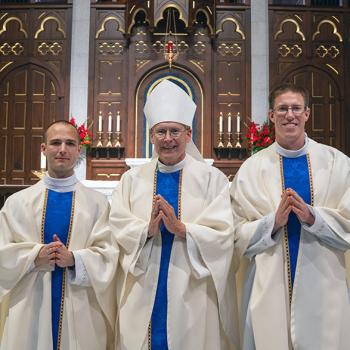Editor's Note: Below is a "Monday Sermon," from our series of sermons at the Patheos Preachers Portal that pastors can enjoy and learn from. It is our hope that this particular series from Daniel Harrell, which preaches through the Church Fathers, will encourage pastors, show them a way of approaching theological education from the pulpit, and refresh their theological memories. See Reverend Harrell's columnist page for more information.
A professor in Bible Belt Georgia teaches a course called Introduction to World Religions and writes that while it helps her predominantly Christian students better understand the world (for instance, the difference between Sunni and Shi'a), the course always backfires when it comes to Christianity itself. Students may be able to name the books of the Bible in order, but rarely do they have any idea how these books were assembled. They know they belong to Victory Baptist Church, but they do not know what makes them Protestants or that the Christian tree has two other major branches more ancient than their own. Very few have heard of the Nicene Creed. Most are surprised to learn that baptism is supposed to be a one-time thing. They never imagined that the first Christians didn't have pocket New Testaments. And they've never considered what occurred during the centuries between Jesus' resurrection and their own professions of faith. They way they figure it, they've simply picked up where the disciples left off.
Martin Luther is to blame for part of this (if you know who Martin Luther is). The 16th-century reformer (and technically the first Protestant) is famous for his insistence on sola scriptura, a cornerstone tenet of the Reformation. Sola scriptura affirms the Bible alone as sufficient for faith and plainly intelligible to anyone who wants to read it. But, as author Jayson Byassee asks, if Scripture is so plainly clear, why did the Reformer John Calvin have to write his voluminous Institutes of the Christian Religion along with a library of commentaries to tell us what the Bible means? And why have subsequent generations of Protestants, each insisting they were following the Bible, shattered like so many pieces of smashed glass into a bewildering variety of denominations and interpretations? As that religion professor showed, being able to read the Bible is no guarantee you understand it. Severing Scripture from its community of interpretive history may have rightly straightened lines of authority, but did it do so at the cost of fully comprehending what that authority teaches?
A growing number of serious Christian readers of the Bible have become persuaded that we can't hope to fully comprehend what Jesus or Paul meant by what they said without seeing how they were read and understood by the likes of Basil, Augustine, Gregory of Nyssa, Aquinas, Luther, Calvin, Barth, or even C.S. Lewis. This is because all Christian readers of Scripture necessarily stand on the interpretive shoulders of past believers and thinkers. Tradition is the memory of the church. And as Augustine argued, we are who we are only through our memories. Did you know that church tradition is actually older than the Bible you hold in your hand? The writings of the first fathers, such as Irenaeus of Lyons, precede the coalescing of the sixty-six books of the Bible into a single authorized canon. This is not to say that Irenaeus predates the biblical authors, but his teaching contributed to the church's affirming the books it did, while rejecting those books, such as The Da Vinci Code, deemed heretical. We have the Bible we have due, in part, to the inspired discernment of the early church fathers.
Irenaeus of Lyons was an indomitable defender of early Christian faith. As the early church was sorting out its theology and practice post-New Testament, it had to confront the dual pressures of reverting back to Judaism and accommodating to Hellenism. In addition, there were also a host of heretical temptations such as Gnosticism, which viewed the created world as an evil from which people need rescue through secret knowledge. The church had to thresh out its responses to these threats with no precedent to guide its thinking. Into this fray emerged Irenaeus whose monumental writing contested false doctrine and steered the church toward its right practice. Irenaeus did this not by coming up with creative theological innovations, but rather by grounding theology in an understanding of that scriptural teaching which tradition had heretofore preserved. His highest aim was to state clearly what the church believed and taught, and to guard that teaching from corruption. In his various statements of faith appear all the essentials of the later Nicene Creed.





